Submitting your short film to a competition is a skill within itself. If you want to go far in the entry process, there are definitely some must-do steps as well as a few to avoid. Check out Rob Munday's three essential tips to follow when entering a film competition...

As a filmmaker, one of the most important lessons to learn is that your job isn’t over once a production is wrapped. If anything, the next step in a film’s journey may be the most challenging part, as you need to work out what to do with your film once it’s complete. Whether you’re a film school graduate or a self-taught director, you would have spent years honing your technical skills to ensure your production is as successful as possible, but no-one would have prepared you for the marketing/distribution side of filmmaking.
Entering your short film into a competition is one avenue for exposure and can be a vital step in boosting your profile as an emerging creative. Short film competitions also offer filmmakers the rare opportunity to recoup some of the financial outlay from production (if there’s a cash prize) or even make additions to your filmmaking kit (competitions often offer equipment as a prize).
However, as I already alluded to in that opening paragraph, entering a competition is a task that demands the care and attention you put into every other area of your production. Without proper thought and planning your entry might never stand a chance of getting the recognition it deserves. With that in mind, here are our three must follow tips to consider when entering your short film into a competition

Do Your Research
Every competition will come with specific guidelines regarding entry requirements and it’s your job as an entrant to ensure your film fits the criteria or else it might be instantly disregarded. This list of rules can range from the simple - minimum/maximum duration - to the more specific - year of production or genre - read them all carefully before submitting to avoid disappointment.
These requirements are here for a reason, so don’t view them as unnecessary red-tape or a waste of time, look at them as something you can use to your advantage when entering a short film competition. If you’ve made a killer sci-fi film are there specific competitions aimed at this genre? If you’ve made a thought-provoking environmental documentary which short film competition is this best suited to? Doing your research before entering a competition is vital, it can increase your chances of winning and ensure no-one is wasting their time.

Stand Out From The Crowd
With every short film competition you enter you’ll be vying with equally talented, passionate creators to grab the attention of the judges, so its down to you to make sure you identify and showcase what makes your entry unique and worthy of consideration. Made on small budget? A passion project? These are qualities your film will probably share with every entry in the competition, so try to find the unique selling point that really makes your work standout.
Short film offers a certain freedom that just can’t be found in other areas of filmmaking and it’s often this lack of restriction that inspires the most exciting and innovative work in this field. The jury of a short film competition will surely have this in mind when it comes to decision time and it will more than likely be reflected in their choices. Original approaches and unique voices are two key qualities in successful short films, if your work contains either make sure to highlight this in your submission and it will help to grab a judge’s attention and make your film standout.

Prepare your Press Pack
Without studying every single short film competition out there, it’s impossible to know the full breadth of entry requirements listed for submitters, but there are certain essentials you can guarantee will appear regularly in their criteria. Being prepared for this before entering will make the submission process simpler (especially if you’re planning to submit to multiple competitions) and in general, is good practice when it comes to the marketing/distribution of a short film.
With this in mind, assembling a press pack should be a key component of your competition strategy, so when it comes to the entry process you can quickly pull together all the material you would need. Here’s a list of what we think that pack should contain:
- Film Description/Synopsis - a simple summary of your film’s plot. Provide a short (one sentence) and long (two to three sentences) version.
- Director’s Statement - a paragraph or two on why you made your film, what was your inspiration/aims and any talk about any novel approaches you employed in production.
- Cast & Crew List - details of everyone involved in production and their roles.
- Images - a selection of key images from your short film, social media friendly visuals and a poster image or thumbnail, if you have one.
- Social Media Links - Links to any key social media accounts associated with the short and its creators and any hashtags that are being used in its promotion.
While following these three simple rules will help your chances in any short film competition you enter, essentially, it’s ultimately the quality of your work that will guarantee success. If you can ensure your film is original, memorable and emotive, then it’s bound to strike a chord with a competition jury and work its way into their consideration when it’s time to hand out the prizes. Just try to remember that there can usually only be one winner (unless a competition has multiple prizes), so if you are unsuccessful don’t let that discourage your filmmaking dreams, keeping making the films that you want to make.
